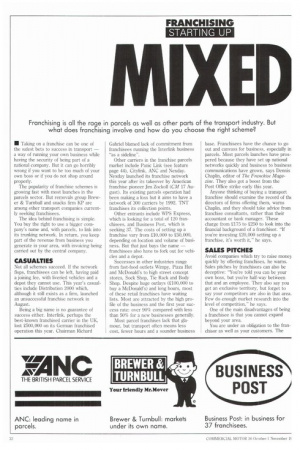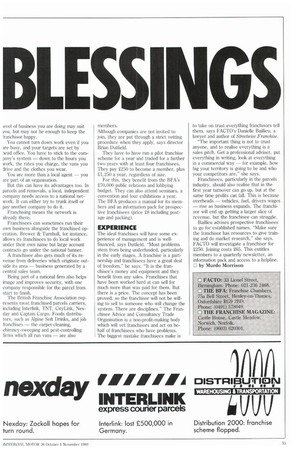NI )( ED B L ESS NGS Franchising is all the rage in
Page 34

Page 35

If you've noticed an error in this article please click here to report it so we can fix it.
parcels as well as other parts of the transport industry. But what does franchising involve and how do you choose the right scheme?
• Taking on a franchise can be one of the safest bets to success in transport — a way of running your own business while having the security of being part of a national company. But it can go horribly wrong if you want to be too much of your own boss or if you do not shop around properly.
The popularity of franchise schemes is growing fast with most launches in the parcels sector. But removals group Brewer & Turnbull and snacks firm KP are among other transport companies currently seeking franchisees.
The idea behind franchising is simple. You buy the right to use a bigger company's name and, with parcels, to link into its trunking network, in return, you keep part of the revenue from business you generate in your area, with invoicing being carried out by the central company.
CASUALTIES
Not all schemes succeed. If the network flops, franchisees can be left, having paid a joining fee, with liveried vehicles and a depot they cannot use. This year's casualties include Distribution 2000 which, although it still exists as a firm, launched an unsuccessful franchise network in August.
Being a big name is no guarantee of success either. Interlink, perhaps the best-known franchised carrier in the UK, lost 2500,000 on its German franchised operation this year. Chairman Richard Gabriel blamed lack of commitment from franchisees running the Interlink business "as a sideline".
Other carriers in the franchise parcels market include Panic Link (see feature page 44), Citylink, ANC and Nexday. Nexday launched its franchise network this year after its takeover by American franchise pioneer Jim Zockoll (CM 17 August). Its existing parcels operation had been making a loss but it aims to have a network of 300 carriers by 1992. TNT franchises its collection points.
Other entrants include WPS Express, which is looking for a total of 120 franchisees, and Business Post, which is seeking 37. The costs of setting up a franchise vary from £10,000 to 250,000, depending on location and volume of business. But that just buys the name — franchisees also have to fork out for vehicles and a depot.
Successes in other industries range from fast-food outlets Wimpy, Pizza Hut and McDonald's to high street concept stores, Sock Shop, Tie Rack and Body Shop. Despite huge outlays (£100,000 to buy a McDonald's) and long hours, most of these retail franchises have waiting lists. Most are attracted by the high profile of the business and the first year success rate: over 90% compared with less than 50% for a new businesses generally.
Most parcel franchises lack that glamour, but transport often means less cost, fewer hours and a sounder business
base. Franchisees have the chance to go out and canvass for business, especially in parcels. Most parcels launches have prospered because they have set up national networks quickly and business to business communications have grown, says Dennis Chaplin, editor of The Franchise Magasine. They also got a boost from the Post Office strike early this year.
Anyone thinking of buying a transport franchise should examine the record of tht directors of firms offering them, warns Chaplin, and they should take advice from franchise consultants, rather than their accountant or bank manager. These charge from £175 to £250 to look into the financial background of a franchisor. "If you're investing 220,000 setting up a franchise, it's worth it," he says.
SALES PITCHES Avoid companies which try to raise money quickly by offering franchises, he warns. Sales pitches by franchisors can also be deceptive: "You're told you can be your own boss, but you're half-way betWeen that and an employee. They also say you get an exclusive territory, but forget to say your competitors are also in that area. Few do enough market research into the level of competition," he says.
One of the main disadvantages of being a franchisee is that you cannot expand beyond your area.
You are under an obligation to the franchisor as well as your customers. The Level of business you are doing may suit you, but may not be enough to keep the franchisor happy.
You cannot turn down work even if you are busy, and your targets are set by head office. You have to stick to the company's system — down to the hours you work, the rates you charge, the vans you drive and the clothes you wear.
You are more than a local agent — you are part of an organisation.
But this can have its advantages too. In parcels and removals, a local, independent company needs access to a national network. It can either try to trunk itself or pay another company to do it.
Franchising means the network is already there.
Franchisees can sometimes run their own business alongside the franchised operation. Brewer & Turnbull, for instance, allows its franchisees to do local work under their own name but large account contracts go under the national banner.
A franchisee also gets much of its revenue from deliveries which originate outside its area — business generated by a central sales team.
Being part of a national firm also helps image and improves security, with one company responsible for the parcel from start to finish.
The British Franchise Association represents most franchised parcels carriers, including Interlink, TNT, CityLink, Nexday and Captain Cargo. Foods distributors, such as Alpine Soft Drinks, and job franchises — the carpet-cleaning, chimney-sweeping and pest-controlling firms which all run vans — are also members.
Although companies are not invited to join, they are put through a strict vetting procedure when they apply, says director Brian Duffield.
They have to have run a pilot franchise scheme for a year and traded for a further two years with at least four franchisees. They pay 2250 to become a member, plus 21,250 a year, regardless of size.
For this, they benefit from the BFA's 270,000 public relations and lobbying budget. They can also attend seminars, a convention and four exhibitions a year. The BFA produces a manual for its members and an information pack for prospective franchisees (price .28 including postage and packing).
EXPERIENCE
The ideal franchises will have some experience of management and is wellfinanced, says Dutfield. "Most problems stem from being underfunded, particularly in the early stages. A franchise is a partnership and franchisees have a great deal of freedom," he says. "It is the franchisee's money and equipment and they benefit from any sales. Franchises that have been worked hard at can sell for much more than was paid for them. But there is a price. The concept has been proved, so the franchisor will not be willing to sell to someone who will change the system. There are disciplines." The Franchisee Advice and Consultancy Trade Organisation is a non-profit-making body which will vet franchisors and act on behalf of franchisees who have problems. The biggest mistake franchisees make is to take on trust everything franchisors tell them, says FACTO's Danielle Baillieu, a lawyer and author of Streetwise Franchise.
"The important thing is not to trust anyone, and to realise everything is a sales pitch. Get a professional adviser, put everything in writing, look at everything in a commercial way for example, how big your territory is going to be and who your competitors are," she says.
Franchisees, particularly in the parcels industry, should also realise that in the first year turnover can go up, but at the same time profits can fall. This is because overheads — vehicles, fuel, drivers wages — rise as business expands. The franchisor will end up getting a larger slice of revenue, but the franchisee can struggle.
Baillieu advises prospective franchisees to go for established names. "Make sure the franchisor has resources to give training and do market research," she says. FACTO will investigate a franchisor for 2250. Joining costs 265. This entitles members to a quarterly newsletter, an information pack and access to a helpline. El by Murdo Morrison






























































































































